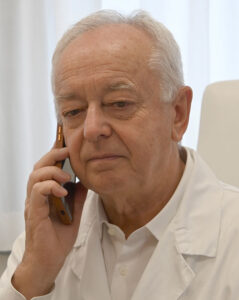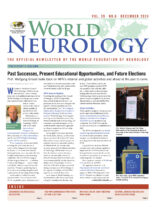The University of Trento and the WFN celebrate the inaugural clinical neuroscience course at the university.
By Prof. Bruno Giometto

Bruno Giometto
In a milestone for neurological education, the University of Trento in Italy marked the launch of its inaugural clinical neuroscience course within the framework of its five-year-old master’s degree in medicine and surgery. The course inauguration was highlighted by the presence of Prof. Wolfgang Grisold, president of the World Federation of Neurology (WFN), who delivered a master class on the global perspectives of teaching neurology. This event underscored the commitment of both the WFN and the University of Trento to advance education and foster collaboration in the field of neuroscience.
The course represents a pioneering step for the University of Trento, which has rapidly emerged as a hub for innovative medical education since the inception of its medical program. Prof. Bruno Giometto, course chair, hosted the event and introduced Prof. Grisold to an audience comprising faculty members, students, and representatives of the neurological community.
Prof. Giometto emphasized the course’s unique design, integrating cutting-edge research with clinical practice, and highlighted the importance of international perspectives in enriching the curriculum.
“The presence of Prof. Grisold symbolizes the alignment of our vision with global efforts to standardize and elevate neurology education,” he said.
Neurology Education on a Global Stage
Prof. Grisold’s master class, titled “Teaching Neurology: A Global Perspective,” offered a comprehensive overview of the current landscape of neurology education, including its challenges and opportunities. He stressed the critical role of the WFN in promoting high-quality training models worldwide and the importance of adapting these models to the diverse health care needs of different regions.
“The World Federation of Neurology is committed to ensuring that neurological education is not just accessible but also relevant and sustainable,” Prof. Grisold said. He outlined key WFN initiatives, such as:
- Training Centers in low- and middle-income countries: The WFN has established partnerships with institutions in underserved regions to provide specialized training programs.
- Standardized curriculum development: Collaborative efforts to create curricula that balance foundational knowledge with region-specific clinical priorities.
- Digital learning platforms: Leveraging technology to bridge gaps in access and enable continuous professional development.
Challenges and Innovations in Neurology Education
In his address, Prof. Grisold lauded the University of Trento’s clinical neuroscience course for its emphasis on a multidisciplinary approach.
“Incorporating neuroscience into the broader framework of medicine ensures that future physicians are not only knowledgeable but also empathetic in addressing the complexities of neurological disorders,” he said.
Prof. Grisold’s visit to Trento also underscored the WFN’s mission to foster collaborations among neurological societies, academic institutions, and international organizations. Through its global reach, the WFN has established itself as a pivotal entity in shaping the future of neurology.
One of the WFN’s landmark initiatives is World Brain Day, which raises awareness about neurological conditions and the importance of brain health. The annual event exemplifies the WFN’s ability to mobilize resources and stakeholders for a common cause. Also, the WFN’s work in research advocacy, policy formulation, and the promotion of neurological services complements its educational endeavors.
A Vision for the Future
The launch of the clinical neuroscience course at the University of Trento represents more than just an academic milestone; it is a testament to the power of collaboration in advancing medical education. The partnership between the university and the WFN sets a precedent for other institutions to emulate, demonstrating that a global perspective can significantly enhance local educational initiatives.
In his concluding remarks, Prof. Grisold encouraged students to embrace their role as future leaders in neurology.
“The study of the brain and nervous system is not merely an academic pursuit; it is a calling to improve lives,” he said.
Prof. Giometto expressed his gratitude to Prof. Grisold and the WFN for their support, reiterating the university’s commitment to fostering excellence in medical education.
“We are at the beginning of a journey, but with partners like the WFN, the path ahead is bright,” he said.
The University of Trento’s medical program is rapidly gaining recognition for its innovative approach, combining rigorous academic standards with opportunities for interdisciplinary research. The addition of the clinical neuroscience course strengthens its reputation as a center for academic and clinical excellence.
The event concluded with a panel discussion featuring faculty members and students, exploring the future of neuroscience education and the potential for further collaborations with international organizations.
Looking Ahead
The successful inauguration of the clinical neuroscience course, marked by Prof. Grisold’s inspiring lecture, is a reminder of the shared commitment of institutions like the WFN and the University of Trento to advancing neurology education. It also highlights the importance of fostering connections across borders to tackle the global burden of neurological disorders.
As the University of Trento continues to develop its medical program, its collaboration with the WFN will undoubtedly serve as a model for other institutions seeking to innovate and excel in the field of neuroscience.
This landmark event is not just a celebration of academic achievement, but also a call to action for the global neurology community to work together in building a future where access to quality neurological education and care is a reality for all. •
Prof. Bruno Giometto is director of neurology at Trento and Roverto Hospitals and a professor of neurology at the Interdepartmental Center of Medical Sciences at the University of Trento.
